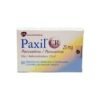What is parnate?
parnate
Get Now
Parnate functions by inhibiting the monoamine oxidase enzyme, which breaks down neurotransmitters like serotonin, norepinephrine, and dopamine in the brain. By preventing this breakdown, Parnate increases the levels of these important chemicals, potentially leading to an improvement in mood and overall mental health.
Indications for Use
Parnate is typically used for:
- Major Depressive Disorder: Especially in cases resistant to other treatments.
- Anxiety Disorders: Sometimes prescribed off-label for anxiety, though this is less common.
- Certain Personality Disorders: In some instances, it may help with specific personality disorders.
Benefits of Parnate
- Efficacy in Treatment-Resistant Depression: it can be particularly effective for patients who have not responded to other antidepressants.
- Quick Onset of Action: Some patients report feeling improvements in mood within a few weeks of starting treatment.
- Unique Mechanism: As an MAOI, Parnate works differently than many other antidepressants, which may provide benefits for individuals who have had limited success with SSRIs or SNRIs.
Potential Side Effects
While it can be effective, it is not without its side effects. Common side effects include:
- Dizziness or lightheadedness
- Insomnia
- Weight gain
- Dry mouth
- Constipation
Dietary Restrictions
One of the most important considerations when taking Parnate is the need for dietary restrictions. Parnate can interact with tyramine, a substance found in certain foods, leading to potentially dangerous increases in blood pressure. Patients should avoid:
- Aged cheeses
- Cured meats
- Fermented foods
- Certain alcoholic beverages
Drug Interactions
it can also interact with other medications, which can lead to serious side effects. It is crucial to inform your healthcare provider about all medications and supplements you are taking, including over-the-counter drugs.
Monitoring and Follow-Up
Patients on Parnate require regular follow-up appointments to monitor their mental health, adjust dosages if necessary, and manage any side effects. Regular blood pressure checks may also be necessary to ensure safety.
Conclusion
it can be a powerful tool for treating depression, especially in individuals who have not responded to other medications. However, its use requires careful management and awareness of dietary restrictions and potential interactions.


